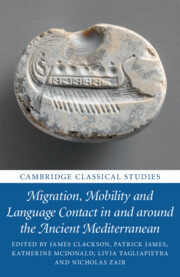Book contents
- Migration, Mobility and Language Contact in and around the Ancient Mediterranean
- Cambridge Classical Studies
- Migration, Mobility and Language Contact in and around the Ancient Mediterranean
- Copyright page
- Dedication
- Contents
- Figures
- Tables
- Contributors
- Acknowledgements
- Abbreviations of Ancient Authors and Works
- Abbreviations of Modern Sources
- Chapter 1 Introduction
- Chapter 2 Interethnic Mobility and Integration in Pre-Roman Etruria
- Chapter 3 Elusive Migrants of Ancient Italy
- Chapter 4 The Language of Mobile Craftsmen in the Western Mediterranean
- Chapter 5 Lost – and Found – in Transmission
- Chapter 6 Mobility and Orthography
- Chapter 7 The Mamertini in Messina
- Chapter 8 Migration, Identity, and Multilingualism in Late Hellenistic Delos
- Chapter 9 Interpretes, Negotiatores and the Roman Army
- Chapter 10 HOC PRIMVS VENIT
- Chapter 11 Population, Migration and Language in the City of Rome
- References
- Index Locorum
- Subject Index
Chapter 5 - Lost – and Found – in Transmission
The Creation of the Oscan Alphabet
Published online by Cambridge University Press: 12 May 2020
- Migration, Mobility and Language Contact in and around the Ancient Mediterranean
- Cambridge Classical Studies
- Migration, Mobility and Language Contact in and around the Ancient Mediterranean
- Copyright page
- Dedication
- Contents
- Figures
- Tables
- Contributors
- Acknowledgements
- Abbreviations of Ancient Authors and Works
- Abbreviations of Modern Sources
- Chapter 1 Introduction
- Chapter 2 Interethnic Mobility and Integration in Pre-Roman Etruria
- Chapter 3 Elusive Migrants of Ancient Italy
- Chapter 4 The Language of Mobile Craftsmen in the Western Mediterranean
- Chapter 5 Lost – and Found – in Transmission
- Chapter 6 Mobility and Orthography
- Chapter 7 The Mamertini in Messina
- Chapter 8 Migration, Identity, and Multilingualism in Late Hellenistic Delos
- Chapter 9 Interpretes, Negotiatores and the Roman Army
- Chapter 10 HOC PRIMVS VENIT
- Chapter 11 Population, Migration and Language in the City of Rome
- References
- Index Locorum
- Subject Index
Summary
As has often been remarked, Oscan inscriptions originate from a large area – Campania, Samnium, Lucania, Bruttium and Sicily – but despite this are remarkably similar in terms of language and spelling, with very little regional variation (see e.g. Rix 1996). Likewise, the Oscan alphabet was created in a context of multiple languages and scripts, the result of a long period of successive migrations to the southern half of the Apennine peninsula; the Etruscans, from Etruria; Greek settlers, from different Greek city-states; and later on the Samnites, from the heights of the Apennine mountain range.
- Type
- Chapter
- Information
- Publisher: Cambridge University PressPrint publication year: 2020

